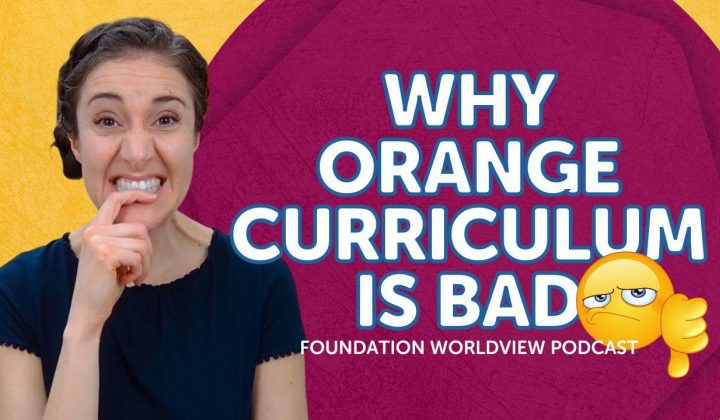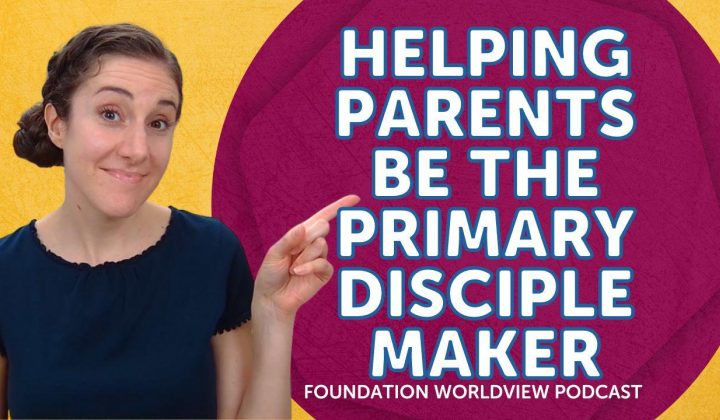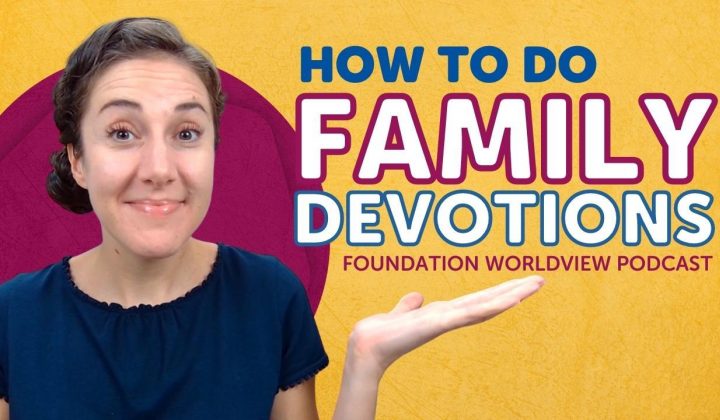Learn more about the journey that led to us equipping kids to carefully evaluate every idea they encounter.
Meet members of our team who have contributed to curriculum development.
Hear from real users of the Foundation Curriculum.
Learn what we believe about God, Jesus, Scripture, and more.
Addressing the Harmful Impact of the Orange Curriculum: Why Orange Curriculum Is Bad (Part 2)
In this episode, we tackle how to approach church leadership when they don’t understand the harm of the Orange curriculum. Learn how to address these concerns while maintaining unity in the church and ensure your kids are being discipled biblically, even when your church uses materials that misinterpret Scripture. Tune in for practical advice on navigating this sensitive issue with grace and conviction.
Transcript
Note: The following is an auto-transcript of the podcast recording.
Listen to Part 1, "Why is Orange Curriculum Bad".
Hello friends. Today's podcast is going to be a little bit of a different format in that I'm not going to be answering a question, but I'm going to be talking about what you can do when your local church leadership doesn't understand why the Orange curriculum is harmful. Just as many of you know, we did a video several years ago on why the Orange curriculum is bad, and that video continues to receive views on YouTube and receive different comments. We've received some critiques from people who don't agree with our evaluation of Orange. Receiving critiques on YouTube is a normal thing; it's a healthy part of putting content out there. But one thing these critiques made me realize is that probably many of you who have listened to that podcast or watched it before and understand what is so problematic with Orange are probably receiving similar feedback at your churches if your church uses Orange and you're trying to help others at your church understand why it is a harmful curriculum and definitely not a beneficial one for your kids' ministry.
So, I'm just going to walk us through in this podcast some of the critiques that we've received after that podcast. And if you have heard something similar at your church, what you can do to move forward in that. Just as a little bit of a caveat, I want to make clear upfront that if your church uses the Orange curriculum, this is not necessarily a reason for you to leave your church. There are going to be many things that Christians disagree over. And while I do genuinely believe that using Orange is harmful for the spiritual development of children, I think it's really important that we seek unity within the body of Christ as we're commanded to in Scripture unless heresy is being taught. So far from what I've seen, I don't see the things that Orange is teaching as being heretical, but I see them as being a misuse of Scripture.
So, if your church uses Orange, but in your corporate worship service, Scripture is being faithfully exposited every week from the pulpit, and this just happens to be a blind spot in your church, I would say do not automatically pack up and leave your church. Don't try to cause disunity. We are not to cause disunity in the church. Don't try to get people on your side and just talk about it behind the leadership's back. None of that honors God. So, if you are in a church that uses Orange, I would definitely advise you not to send your children to the kids' ministry because they're going to get a faulty understanding of what Scripture teaches. However, if you don't send your kids to the kids' ministry, that's okay because if you are a parent listening to this podcast, you already understand that you are the primary disciple-maker in your home. Anything that your local church does program-wise can be a helpful support to you, but it is not primary. As a member of a local church, when you are worshiping corporately together and living daily life in the body of Christ, you do not need kids' programming. Beneficial kids' programming can be a great add-on to what you're already doing at home, but it is not necessary for your children's spiritual development. What is primary is that you are discipling your children well at home, you're immersing them in Scripture, you're attending corporate worship together, and you're living life as the body of Christ weekly. I just wanted to cover this as a caveat because I do not want to sow disunity in churches. I do not want to encourage people to leave their churches over a disagreement with the materials being used in the kids' ministry. So, I just wanted to start with that as a caveat. Now, I'm going to walk you quickly through the main points I made in the critique of the Orange curriculum, the critiques that we received, and how you can proceed if you’ve received similar feedback when you've brought up to your church leadership why you think using the Orange curriculum isn’t best.
In that video, the main point I made was that Orange incorrectly interprets Scripture and uses a biblical narrative to teach a predetermined moral lesson that the original author never intended to teach. I did not give hundreds of examples; I gave two specific ones. If you've used the Orange curriculum before, you can probably come up with more. The two examples I gave were in the book of Acts, the story of Peter and John healing the lame man at the temple and then getting questioned and imprisoned by the Sanhedrin. Orange used that story to teach resilience, saying Peter and John kept going when it got tough, they relied on God, and they were resilient. However, when we look at that narrative, we see very clearly that it’s not about human resilience. It’s about the faithfulness of God fulfilling His covenant promise to build His church, and the gates of hell will not prevail.
The second example I gave was from the book of 1 Samuel, chapter 17, the narrative of David and Goliath. Orange's main lesson from that story was to "honor others by giving them a chance," claiming that David was the little guy everyone looked down on, but they honored him by giving him a chance, and he slayed Goliath. When we look at that story in its proper context, we see that God is ushering in the Davidic kingdom, being faithful to His covenant to protect His people and ultimately usher in the Messiah. These are just two examples of how Orange looks for a lesson—some kind of character quality like resilience or giving others a chance—and then finds a biblical narrative to teach that lesson to children. As I said in that video, this teaches our children a faulty hermeneutic. It teaches them that Scripture is all about themselves and their behavior, living a moral life, rather than helping our kids understand that Scripture is ultimately revealing truths about who God is and His grand plan for the world. Does Scripture include moral standards? Yes, absolutely. But the Bible isn't primarily a book about morality. It's primarily a book that reveals who God is and His plan to rescue us from our sin. That was the main point of the critique I gave of Orange in that first video.
Now, some of the criticism and pushback we've received online, which I’m sure others will be receiving from their church leadership or those in children's ministry at your church, can be summarized into four main points. The first was, "Elizabeth, you don’t understand the strategy of Orange. It’s an all-encompassing strategy of a partnership between the church and the home." I didn’t say anything about whether Orange is a partnership between the church and the home, but that was one critique we received. Another was, "Elizabeth, you’re cherry-picking examples based on your own interpretation of Scripture." While I wasn’t cherry-picking examples, I highlighted the two different months of Orange curriculum I reviewed, and I genuinely believe what I presented was not my own interpretation of Scripture, but rather what the original authors intended and how God is weaving together the entire narrative of Scripture. The third critique was, "Elizabeth, you’re missing the heart of what Orange is seeking to do." That’s true; I wasn’t covering Orange’s overarching plan, but rather how they were executing it. The fourth critique was that I don’t understand how great Orange is because "Orange is developmentally appropriate." I didn’t address the developmental appropriateness of Orange in my video, although they do have strategies behind it. However, that wasn’t the main focus.
If this happens to you—if your church leadership or someone running the kids' ministry comes back with these arguments, such as "You just don’t understand Orange’s strategy," "You’re cherry-picking examples," "You’re missing the heart of Orange’s mission," or "Orange is developmentally appropriate"—my encouragement to you is to stick to the main point and avoid getting distracted by these rabbit trails. I'm not going to address those four points here because they’re not the core issue. The main issue is: Is Orange correctly interpreting Scripture? Are they helping kids correctly understand what different biblical narratives are teaching? If someone comes back with, "Well, you just don’t understand the philosophy," respond with, "This isn’t a question about philosophy; the main question is whether Orange is correctly interpreting Scripture." I encourage you to find several examples of the main points taught over the past few months from different passages and ask your church leadership if they agree that the interpretation is correct. Is this the intent of the original author, or is it just trying to teach a moral lesson that isn’t actually in the text? Stick to the main issue: Is Orange correctly interpreting Scripture?
Now, this can be difficult to spot, even for some in church leadership. Thankfully, many in church leadership will be able to recognize this from a mile away because they’ve been well-trained and are immersed in sound biblical hermeneutics, which is just a fancy word for understanding the Bible. However, some may not spot it because so many materials produced by Christian companies do this. They take a passage of Scripture meant to point us to God and reveal truths about Him, but instead make the focus completely on us as humans.
I recently saw an example of this that my mom brought to my attention. She purchased an Easter devotional book from a trusted company, with copies for herself, my sister-in-law, and my sister. However, she told me, "Elizabeth, I had to return all three copies." She said the activities were fun and developmentally appropriate, but the focus of the devotional was all on us as humans rather than on God and what He has done for us. The example my mom gave was a section of the devotional that covered Judas betraying Jesus for silver and then betraying Him with a kiss. Instead of focusing on how this was part of God’s plan and how Jesus died for those who betrayed Him, the devotional focused on us. It asked, "Have you ever been betrayed by someone? How did you feel? What can we learn from how Jesus responded?" While we can learn from how Jesus responded, that's not the main focus of the passage. Judas isn't included in Scripture primarily to teach us how to handle betrayal. Judas’s role in Scripture is to further the narrative of Jesus’s life, death, and resurrection and how we have all betrayed Jesus. We’ve all broken God’s moral law, yet Jesus still willingly died in our place. This squeezing of moral lessons to focus on us as humans, rather than lifting our eyes to God, is sadly a common practice throughout the evangelical world, so it can be difficult even for church leadership to recognize it. This is why we must keep coming back to the main question: Is Orange correctly interpreting Scripture? Because that is the core issue.
As I mentioned, some of the critiques we've received are more about the philosophy of Orange, and many churches are going to stick to that philosophy. I have to admit that the philosophy of a parent-church connection is a good and biblical one—the church should support what parents are already doing at home. Orange does provide comprehensive resources for the home, including their Parent Cue app, which helps parents think of good questions and activities to go through with their kids, as well as devotional materials and follow-up content from lessons. It's an all-encompassing philosophy, and it's a good one. However, the philosophy is only as strong as its underlying biblical interpretation. If the biblical interpretation is off, it doesn’t matter how sound the philosophy is. Even if the home-church connection philosophy is strong, if the biblical interpretation is unsound, it won’t lead to a strong home-church connection.
A good analogy would be an overall health plan for a child. Let’s say this health plan includes making sure the child gets enough sleep, physical activity, a balanced diet, and social interaction. That’s great, but if there’s misinformation in one part of the plan, the whole thing fails. For example, if you think your 8-year-old only needs seven to eight hours of sleep a night, the plan will fail because an 8-year-old actually needs nine to ten hours of sleep. Similarly, if you misunderstand what a healthy diet is and leave out protein, the overall health plan fails. The same goes for Orange’s philosophy. It might be great in theory, but if the biblical interpretation is faulty, the philosophy won’t hold.
For those of you in this situation, where your church leadership doesn’t seem to understand why Orange is not beneficial, I encourage you to keep coming back to the question: Is Orange correctly interpreting Scripture? If your church leadership believes that Orange is interpreting Scripture correctly, that’s when you might need to consider whether your church leadership truly understands how to read, interpret, and apply Scripture soundly. This doesn’t mean you should automatically leave the church, but it is something to pray through if you notice that the leadership doesn’t seem to correctly exposit God’s Word.
If you decide to stay in a church that continues to use Orange, but you believe the corporate worship services faithfully preach God’s Word, one thing you can do is model strong discipleship at home for other families. Open your home and show others how you disciple your children. When other families see how you are discipling your children, they will take notice. Sadly, many churches have overstepped their God-given boundaries and tried to take on the role of the parent, thinking they can make up for parents’ lack of discipleship through programming. But programming won’t help; parents must be the primary disciplers of their children. What will make a difference is you modeling this for others and opening up your home to show them how to disciple their own children. Transformation doesn’t happen overnight. Sometimes it takes months or even years, but modeling this behavior will help make a difference in the families of your local church.
For those of you thinking about talking to your church leadership about Orange, if they agree with your concerns and recognize that Orange is not correctly interpreting Scripture, two programs we recommend at Foundation Worldview that offer comprehensive materials for Sunday School or kids' ministry are The Gospel Project, which is put out by Lifeway, and Truth78, which is put out by Desiring God. I highly recommend checking out The Gospel Project by Lifeway or Truth78 by Desiring God.
That wraps up this episode. If you have a question you’d like me to answer on a future Foundation Worldview podcast, you can go to FoundationWorldview.com/podcast to submit your question. As we close, my prayer for you remains the same as always: that no matter the situation in which you and the children God has placed in your care find yourselves, you would trust that God is working all things together for your good by using all things to conform you more to the image of His Son. I'll see you next time.
Related Posts and insights

Why Orange Curriculum is Bad
In this eye-opening podcast episode, Elizabeth Urbanowicz analyzes the effectiveness of the popular Orange Curriculum and discusses the pitfalls of proof-texting moral lessons. We'll even look at scripture-based alternatives to Orange Curriculum. Don't miss this essential conversation on transforming kids' ministry for the better!

Helping Parents be the Primary Disciple Maker
How do we help parents be equipped to disciple the children in their care? In this episode, Elizabeth Urbanowicz, speaks to parents and church ministry leaders about how we can help parents see the need to be the primary disciple makers to their children, and how this can be modeled for other parents.

How To Do Family Devotions
Elizabeth Urbanowicz shares her experience growing up with family devotions and provides ideas on how to start and lead family devotions.





